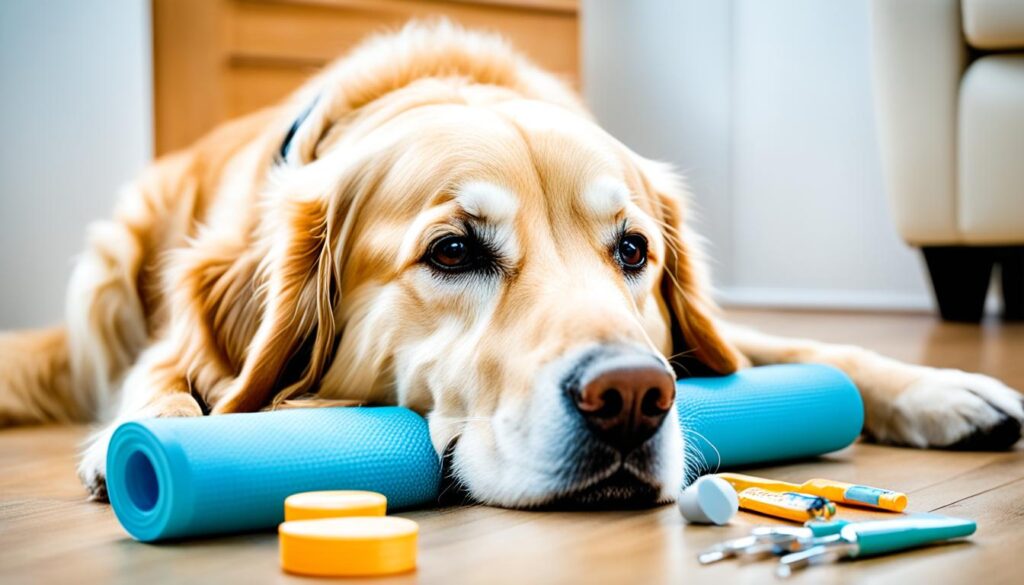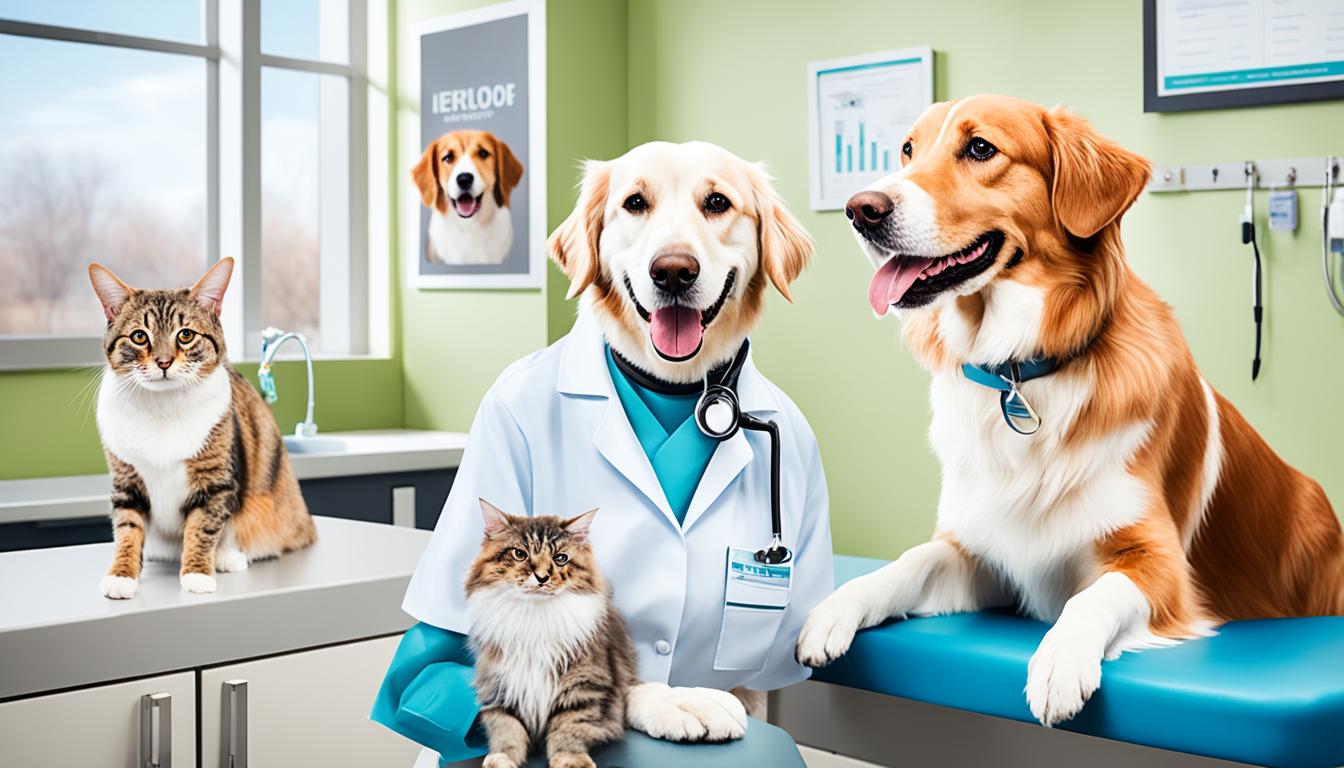As our beloved pets age, they go through various age-related changes that can affect their health and well-being. In this comprehensive guide, we will explore the important aspects of senior pet health and provide tips on how to manage age-related changes and care for our furry friends during their golden years. From understanding the different types of changes to implementing preventative care strategies, nutrition, mental health, and end-of-life care planning, we will cover everything you need to know to ensure that your senior pet remains happy and healthy for as long as possible.
Key Takeaways:
- Implementing preventative care strategies can help keep senior pets healthy and comfortable.
- Understanding age-related changes and providing appropriate care is essential for senior pet wellness.
- Regular veterinary check-ups and vaccinations are crucial for senior pet health.
- Proper nutrition, hydration, and exercise are key to senior pet well-being.
- Mental health and behavior should be addressed to ensure a high quality of life for senior pets.
Understanding Senior Pet Vitality
As our pets age, they go through various changes that can impact their overall vitality and well-being. It is essential for pet owners to understand these changes and provide the necessary care to ensure a comfortable and fulfilling life for their senior pets. In this section, we will explore age-related and pathological changes in senior pets, their dietary needs and nutrient absorption, as well as how to adapt to sensory changes such as sight and hearing.
Age-related vs Pathological Changes
Senior pets experience age-related changes that are a natural part of the aging process. These changes include vision and hearing loss, reduced mobility, and a decrease in cognitive function. While these changes cannot be fully prevented, they can be managed and adapted to through the appropriate care and support.
On the other hand, pathological changes refer to diseases and health conditions that may affect senior pets. Regular veterinary check-ups and good care can help prevent or treat many of these conditions, ensuring the overall well-being of our furry companions.
Dietary Needs and Nutrient Absorption in Senior Pets
Senior pets may have different dietary needs compared to their younger counterparts. Changes in activity levels, muscle mass, and nutrient absorption can impact their nutritional requirements. It is crucial to provide a balanced diet that meets their specific needs to support their overall health and vitality in their golden years.
Nutrient absorption in senior pets may also be compromised due to age-related changes in the digestive system. This can result in a decreased ability to absorb certain nutrients, making it important to choose high-quality, easily digestible food to ensure optimal nutrient absorption.
Adapting to Sensory Changes: Sight and Hearing
As senior pets age, they may experience changes in their sight and hearing. These changes can vary from mild to severe and may affect their daily activities and overall quality of life. It is crucial for pet owners to recognize and adapt to these sensory changes to provide the necessary support and ensure the well-being of their senior pets.
Adapting to changes in sight can include providing well-lit environments, avoiding obstacles, and maintaining a consistent routine to minimize confusion. For pets experiencing hearing loss, it is important to use visual cues, such as hand signals, to communicate effectively and make their daily life more manageable.
Preventative Care Strategies
In order to ensure the health and well-being of our senior pets, it is essential to implement preventative care strategies that address their specific needs. This includes regular veterinary check-ups, tailored vaccination protocols, and dental health maintenance.
The Importance of Regular Veterinary Check-Ups
Regular veterinary check-ups play a vital role in the overall health management of senior pets. These routine visits allow for early detection and intervention of any potential health issues before they become more serious. During these check-ups, the veterinarian will assess your senior pet’s physical condition, perform necessary tests, and provide guidance on specific care requirements.
Vaccinations and Boosters: Tailored Protocols for Aging Pets
Vaccinations are an essential part of preventative care for senior pets. As they age, their immune systems may weaken, making them more susceptible to certain diseases. Tailored vaccination protocols, based on your pet’s age and unique health needs, are crucial for maintaining their immunity and protecting them from preventable illnesses. Your veterinarian will recommend the appropriate vaccines and boosters to ensure your senior pet’s well-being.
Dental Health: A Crucial Element for Longevity
Maintaining good dental hygiene is essential for the overall health and longevity of senior pets. Dental disease can lead to pain, infection, and other health problems, impacting their quality of life. Regular dental care, including professional cleanings and proper at-home dental care routines, can help prevent dental issues and contribute to their overall well-being.
By prioritizing regular veterinary check-ups, tailored vaccination protocols, and dental health maintenance, we can ensure that our senior pets receive the preventive care they need to live happy and healthy lives well into their golden years.
Pet Health and Wellness Tips
In this section, we will provide a comprehensive list of health and wellness tips for senior pets. Taking care of your senior pet’s health is essential to ensure they have a happy and comfortable life. By following these tips, you can help promote their overall well-being and address any age-related changes they may be experiencing.
1. Proper Nutrition: Feed your senior pet a balanced diet that is suitable for their age and specific dietary needs. Consult with your veterinarian to determine the appropriate type and amount of food to provide.
2. Hydration: Ensure that your senior pet has access to fresh and clean water at all times. Monitor their water intake to prevent dehydration, which can be a common issue in older pets.
3. Exercise: Regular exercise is important for maintaining muscle strength and mobility in senior pets. Tailor exercise routines to their individual needs and capabilities, considering any joint issues or limitations they may have.
4. Grooming: Maintain a regular grooming routine to keep your senior pet’s coat clean and healthy. Brush their fur to reduce shedding and mats, trim their nails, and clean their ears and teeth as needed.
5. Stress Management: Provide a calm and stress-free environment for your senior pet. Minimize loud noises, excessive activity, and sudden changes to help them feel secure and relaxed.
6. Mental Stimulation: Engage your senior pet’s mind with interactive toys, puzzle feeders, and regular playtime. Mental stimulation can help prevent cognitive decline and keep them mentally sharp.
7. Regular Veterinary Check-ups: Schedule regular check-ups with your veterinarian to monitor your senior pet’s overall health. Vaccinations, dental care, and early detection of any health issues are crucial for their well-being.
8. Comfort: Create a comfortable and safe environment for your senior pet. Provide cozy bedding, consider temperature control to keep them comfortable, and make any necessary home adjustments to accommodate their mobility needs.
9. Supplements: Consult with your veterinarian about any necessary supplements or medications that can support your senior pet’s health. Joint supplements, omega-3 fatty acids, and vitamins may be beneficial for certain conditions.
10. Love and Attention: Above all, shower your senior pet with love, attention, and companionship. Spending quality time with them and providing emotional support can greatly contribute to their overall well-being.

Creating a Comfortable Environment for Aging Pets
As our pets age, it’s important to provide them with a comfortable and supportive environment that meets their specific needs. Making a few adjustments to our homes can go a long way in enhancing their overall well-being and quality of life. In this section, we will explore home adjustments for impaired mobility and the role of bedding and temperature control in creating a comfortable environment for senior pets.
Home Adjustments for Impaired Mobility
To help aging pets with mobility issues, it’s essential to make necessary adjustments to our homes. Here are some home modifications you can consider:
- Provide ramps or stairs: Installing ramps or stairs can assist pets with impaired mobility in navigating different areas of the house, eliminating the need for them to struggle with climbing or descending.
- Secure rugs and carpets: Make sure rugs and carpets are securely fastened to prevent tripping hazards and ensure a stable surface for pets to walk on.
- Clear clutter: Remove any unnecessary furniture or objects that may obstruct your pet’s movement, creating a safer and more accessible living space.
- Create a cozy resting area: Set up a comfortable and easily accessible resting area for your senior pet where they can relax and retreat to whenever they need a break.
The Role of Bedding and Temperature Control
Comfortable bedding and proper temperature control are crucial for the well-being of senior pets. Here’s what you need to keep in mind:
- Choose supportive bedding: Providing your aging pet with a supportive and orthopedic bed can help alleviate joint pain and provide them with a comfortable place to rest.
- Consider heated bedding: For senior pets who may struggle with arthritis or feel the cold more intensely, heated beds or blankets can offer added warmth and relieve any discomfort.
- Provide cozy blankets: Soft blankets can offer extra insulation and provide a sense of security and comfort for your senior pet.
- Maintain a comfortable temperature: Keep your home at a consistent temperature that is suitable for your pet’s comfort. Avoid extreme temperatures that may be too hot or too cold.
| Home Adjustments for Impaired Mobility | The Role of Bedding and Temperature Control |
|---|---|
| Provide ramps or stairs | Choose supportive bedding |
| Secure rugs and carpets | Consider heated bedding |
| Clear clutter | Provide cozy blankets |
| Create a cozy resting area | Maintain a comfortable temperature |
Nutrition for Senior Pets
Proper nutrition is essential for maintaining the health and well-being of senior pets. As our pets age, their dietary needs change, requiring special considerations to address their specific needs. In this section, we will explore important aspects of senior pet nutrition, including addressing obesity and weight management, monitoring water intake, and special dietary considerations and supplements.
Addressing Obesity and Weight Management
Senior pets are more prone to weight gain, which can lead to various health issues such as arthritis, diabetes, and heart disease. Managing their weight through proper nutrition is crucial to ensure their overall well-being and longevity. Incorporating a balanced diet with the appropriate calorie intake and portion control can help prevent obesity. Consulting with a veterinarian to develop a weight management plan tailored to your senior pet’s needs is recommended.
Hydration: Monitoring Water Intake
Senior pets may require more frequent access to water to prevent dehydration, as they may have decreased thirst or kidney function. Monitoring their water intake is essential to ensure they are adequately hydrated. Providing fresh, clean water at all times and encouraging regular water breaks can help maintain their hydration levels. If you notice any significant changes in your pet’s water intake, it is important to consult with your veterinarian.
Special Dietary Considerations and Supplements
Senior pets may have special dietary considerations due to age-related changes in their metabolism, digestion, and nutrient absorption. It is important to provide them with a balanced diet that meets their specific nutritional requirements. Senior pet formulas are available in the market, which are specifically formulated to address the needs of aging pets. Additionally, supplements such as joint support supplements or omega-3 fatty acids can be beneficial in supporting their overall health and well-being. Consultation with a veterinarian is recommended to determine if your senior pet would benefit from any specific dietary considerations or supplements.

| Nutrition Tips for Senior Pets |
|---|
| 1. Provide a balanced diet formulated for senior pets. |
| 2. Monitor portion sizes to prevent overfeeding and obesity. |
| 3. Incorporate regular exercise to maintain muscle tone and weight. |
| 4. Offer fresh, clean water at all times and encourage regular water breaks. |
| 5. Consult with a veterinarian for specific dietary considerations and supplements. |
Mental Health and Behavior
Just like humans, senior pets can experience changes in their mental health and behavior. As pets age, they may exhibit signs of anxiety, depression, cognitive decline, or changes in their social interactions. It’s important for pet owners to be aware of these changes and take steps to promote their senior pet’s mental well-being.
Mental stimulation is key to keeping senior pets engaged and mentally sharp. Providing interactive toys, puzzle feeders, and regular playtime can help keep their minds active and prevent boredom. In addition, incorporating training sessions into their daily routine can provide mental stimulation while reinforcing good behavior.
Managing stress is also essential for senior pets’ mental health. Changes in routine, new environments, and loud noises can cause anxiety and distress. Creating a calm and safe environment, using pheromone diffusers or calming aids, and establishing a predictable routine can help reduce stress and promote a sense of security.
Behavioral changes such as aggression, house soiling, or excessive vocalization can also occur in senior pets. It’s important to address these changes promptly by consulting with a veterinarian or a professional animal behaviorist. They can provide valuable guidance and develop a behavior modification plan tailored to your pet’s specific needs.
In conclusion, prioritizing mental health and addressing behavioral changes in senior pets is crucial for their overall well-being. By providing mental stimulation, managing stress, and seeking professional guidance when needed, pet owners can ensure that their senior pets maintain a good quality of life in their golden years.
Physical Health and Mobility
Managing Arthritis and Joint Pain

Arthritis is a common condition that affects many senior pets, causing pain and discomfort in their joints. It can significantly impact their mobility and overall physical health. As responsible pet owners, it is crucial to understand how to manage arthritis in senior pets effectively.
Consulting with your veterinarian is the first step in identifying and diagnosing arthritis in your pet. They can recommend a variety of treatments and management strategies based on your pet’s specific needs. These may include:
- Prescription medication to manage pain and inflammation
- Weight management to reduce strain on joints
- Physical therapy and rehabilitation exercises
- Joint supplements to support joint health
In addition to professional guidance, you can also make changes at home to help alleviate your senior pet’s arthritis symptoms. Providing them with a comfortable and supportive bed, using ramps or stairs to help them navigate, and ensuring a warm environment can all contribute to their physical well-being.
Exercise Tips for the Older Pet
Regular exercise is essential for senior pets to maintain muscle strength, flexibility, and overall mobility. However, it is crucial to tailor their exercise routine to their abilities and limitations.
Safety is paramount when exercising older pets, as they may be more prone to injuries. Here are some exercise tips to keep in mind:
- Consult with your veterinarian before starting or modifying an exercise routine
- Choose low-impact exercises such as walking or swimming
- Monitor their energy levels and adjust the intensity and duration accordingly
- Incorporate mental stimulation through interactive toys and puzzles
Remember, consistency is key. Regular, gentle exercise helps keep your senior pet’s muscles strong, maintains joint flexibility, and contributes to their overall well-being.
End-of-Life Care Planning
As our pets age, it is important to face the reality of their limited lifespan. Understanding and preparing for the end-of-life journey with your senior pet is a crucial part of responsible pet ownership. In this section, we will explore end-of-life care planning for senior pets, including legal considerations and emotional support to help you navigate this challenging and heartbreaking time.
Understanding and Preparing for the Inevitable
As much as we wish our pets could stay with us forever, it is essential to come to terms with the fact that their time with us is limited. By acknowledging the inevitability of pet loss, we can better prepare ourselves and provide the best possible care for our senior pets during their final stage of life. This includes understanding the signs of decline, knowing when it may be time to consider euthanasia, and making arrangements for a peaceful transition.
Legal and Emotional Considerations
End-of-life care planning for senior pets also involves important legal considerations. It is advisable to consult with an attorney who specializes in estate planning to ensure that your pet’s needs are addressed in your will or trust. This may include designating a caregiver for your pet, allocating funds for their care, and outlining specific instructions regarding their end-of-life preferences.
Emotional support is crucial during the grieving process, both before and after the loss of a beloved pet. Seek support from friends, family, or pet loss support groups who can provide understanding and empathy during this difficult time. Engaging in activities that provide comfort and solace, such as creating a memorial for your pet or seeking therapy, can also help you cope with the emotional impact of pet loss.

End-of-life care planning is a deeply personal and emotional journey. By understanding the inevitable, addressing legal considerations, and seeking emotional support, you can provide the best possible care and support for your senior pet during their final stage of life.
Adopting and Caring for Senior Pets
Adopting a senior pet can be a truly fulfilling experience, providing both joy and companionship in a unique way. However, it also comes with its own set of responsibilities. Caring for an older pet requires patience, understanding, and a commitment to their specific needs.
When you adopt an older pet, you have the opportunity to provide them with a loving home during their golden years. These pets have so much love and gratitude to give, and they often form deep bonds with their new owners. The joys of adopting an older pet include:
- Instant companionship: Senior pets are often well-behaved, calm, and ready to be your steadfast companion. You can skip the challenging stage of housebreaking and training, and instead enjoy the company of a loyal and grateful companion.
- Saving a life: By adopting a senior pet, you are giving them a second chance at happiness. Many older pets end up in shelters due to unforeseen circumstances, and providing them with a loving home can be a life-changing experience for both of you.
- A settled and predictable routine: Senior pets often have established habits and routines. They are content with a more relaxed pace of life and are generally more predictable in their behavior. This can bring stability to your household and make the transition smoother for everyone involved.
However, it’s important to understand that caring for a senior pet also requires extra attention and consideration. As pets age, their bodies may become more frail, and they may develop health issues that require ongoing care. Regular veterinary check-ups, a balanced diet, and a comfortable environment are all vital for their well-being.
Flea and Parasite Control in the Senior Pet
Even though senior pets may not be as active as they once were, they can still be susceptible to fleas and parasites. Flea control remains essential to keep them comfortable and prevent infestations. Parasite control is crucial for their overall health and should not be neglected.
Implementing a comprehensive flea and parasite control regimen for your senior pet is necessary to ensure their comfort and prevent any related health issues. It is important to consult with your veterinarian to determine the most appropriate preventive options for your pet’s specific needs and health conditions.
| Flea and Parasite Control Tips for Senior Pets |
|---|
| 1. Regularly check your senior pet for signs of fleas such as excessive scratching, irritation, or the presence of small black specks (flea dirt). |
| 2. Use veterinarian-approved flea prevention products specifically formulated for senior pets. |
| 3. Maintain a clean and hygienic environment by regularly washing your pet’s bedding and vacuuming their living areas. |
| 4. Practice good grooming habits, including regular brushing to help detect and remove any parasites or flea eggs. |
| 5. Stay consistent with your pet’s flea prevention regimen and consult your veterinarian for any concerns or questions. |
Conclusion
In conclusion, senior pet health requires special attention and care. As our beloved pets age, they go through various age-related changes that can affect their health and well-being. By understanding these changes and their impact, we can take proactive measures to ensure that our senior pets enjoy a happy and healthy life in their golden years.
Implementing preventative strategies is essential in managing age-related changes in pets. Regular veterinary check-ups play a crucial role in detecting and addressing any health issues early on, allowing for timely intervention and treatment. Additionally, tailored vaccination protocols and good dental hygiene contribute to maintaining their overall health and well-being.
Nutrition and mental health support also play vital roles in senior pet care. Providing a balanced diet that meets their specific needs, addressing obesity and weight management, and monitoring water intake for hydration are essential to their overall health. Along with proper nutrition, mental stimulation and stress management contribute to their mental well-being.
With a comprehensive approach to senior pet care, our furry friends can thrive and continue to bring joy and companionship for many years to come. By implementing these practices and giving them the attention they deserve, we can ensure that our senior pets enjoy their golden years to the fullest.
FAQ
What are age-related changes in senior pets?
Aging pets experience normal changes such as vision and hearing loss, which cannot be prevented but can be managed and adapted to.
Can diseases and health conditions be prevented or treated in senior pets?
Yes, many diseases and health conditions can be prevented or treated in senior pets through good care and regular veterinary check-ups.
Do senior pets have different dietary needs?
Yes, senior pets may have different dietary requirements due to changes in activity levels, muscle mass, and nutrient absorption.
How can I accommodate sensory changes in my senior pet?
Understanding and accommodating sensory changes in senior pets, such as sight and hearing loss, can improve their quality of life.
How often should I take my senior pet to the vet?
Regular visits to the vet are crucial for detecting and addressing any health issues early on in senior pets.
Are vaccinations still necessary for senior pets?
Yes, age-appropriate vaccination protocols are important for senior pets to maintain their immunity and protect them from preventable diseases.
Why is dental health important for senior pets?
Maintaining good dental hygiene is essential for senior pets as dental disease can lead to pain, infection, and other health problems.
How can I help my senior pet with impaired mobility?
Making necessary adjustments to your home, such as providing ramps or stairs, can help senior pets with impaired mobility navigate their surroundings.
What role does bedding play in the comfort of senior pets?
Providing comfortable bedding for senior pets is important for their overall comfort and well-being.
How can I address obesity in my senior pet?
Proper nutrition and weight management strategies can help maintain a healthy weight for senior pets and prevent various health issues.
How can I ensure my senior pet stays hydrated?
Monitoring your senior pet’s water intake and providing frequent access to water can help prevent dehydration.
Are there special dietary considerations for senior pets?
Senior pets may have specific dietary needs and may benefit from supplements to support their overall health and well-being.
How can I promote mental stimulation in my senior pet?
Providing mental stimulation through interactive toys, puzzles, and regular playtime can help keep senior pets mentally sharp and engaged.
What can I do to manage arthritis and joint pain in my senior pet?
There are various strategies, such as joint supplements and gentle exercise, that can help manage arthritis and alleviate joint pain in senior pets.
How often should I exercise my older pet?
Regular exercise is important for senior pets to maintain muscle strength and overall mobility, but it should be done in moderation and tailored to their individual needs.
How can I prepare for the end-of-life journey with my senior pet?
Understanding and preparing for the inevitable end-of-life journey with your senior pet involves addressing legal considerations, making decisions about euthanasia, and seeking emotional support during this difficult time.
What are the joys and responsibilities of adopting a senior pet?
Adopting a senior pet can be a rewarding experience, but it also comes with unique responsibilities such as providing specialized care and understanding their individual needs.
Do senior pets still need flea and parasite control?
Yes, senior pets are still at risk of flea infestations and parasites, so it’s important to maintain regular flea and parasite control to protect their health.
Source Links
- https://www.kingscanyonveterinaryfoundation.com/library/senior-pets/
- https://www.graygroupintl.com/blog/senior-pets
- https://www.kingscanyonveterinaryfoundation.com/library/senior-pets/managing-senior-pet-health-dogs/

